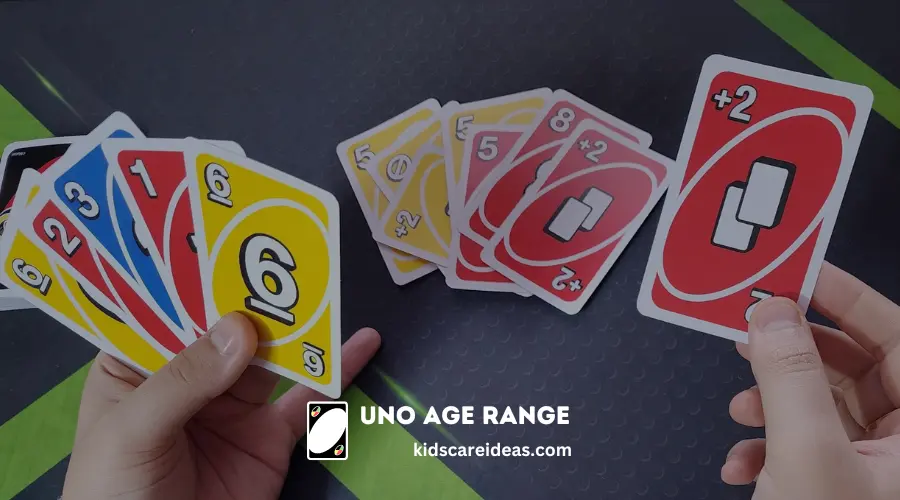UNO is a classic card game that has been enjoyed by millions of people around the world for over 50 years. It is a fast-paced, competitive game that requires players to race to get rid of all their cards. But what is the recommended UNO age range?
In short: The Recommended Age Range to play UNO is 7 years and up as recommended by Mattel.

Let’s get started!
UNO Age Range
UNO is recommended for ages 7 and up.(Source) This means that the game is suitable for children as young as 7, as well as adults. The age range is based on the game’s level of difficulty, as well as the simplicity of the rules. There are UNO versions like UNO Junior suited for 3 years and above. (Source)
UNO is a game that can be enjoyed by the whole family, as well as by groups of friends. It is a great way to spend time together, and to challenge each other in a friendly competition. The game is also a great way to improve children’s basic math skills, as they need to add up their points at the end of each round.
UNO is a game that is easy to learn, but difficult to master. This means that it is a great game for both beginners and experienced players. The game is fast-paced and exciting, and it is a great way to pass the time when you are looking for something fun to do.
Developmental Benefits of Playing UNO for Different Age Groups
Playing UNO can offer a range of developmental benefits for people of all ages, including young children, older children, teenagers, and adults. Let’s take a closer look at the ways UNO can help different age groups grow and develop:
For Young Children
For young children, UNO can help improve their color recognition, counting, and basic arithmetic skills.
According to several studies, playing games like UNO can also promote language development and social interaction.(From Verified Sources: Source 1, Source 2)
For Teenagers
As children grow older, playing UNO can help them develop critical thinking and strategy skills. This can be especially beneficial for teenagers, who can use UNO as an opportunity to practice teamwork, communication, and problem-solving skills.
For Adults
For adults, playing UNO can offer a fun and relaxed way to socialize and relieve stress. It can also provide an opportunity to exercise their memory and cognitive skills, and to continue learning new strategies and techniques.
As you can see, playing UNO offers a range of benefits for people of all ages. Whether you’re looking to improve your skills, socialize with friends, or just have a fun time, UNO is a game that has something for everyone!
Game Play
Each player starts with seven cards and must match the number or color of the card in the discard pile. Special action cards, such as “Skip Card” or “Reverse Card,” add to the excitement of the game.
Players must say “UNO” when they have only one card left, or they risk having to draw two additional cards. The first player to get rid of all their cards wins the round.
Read More to know about how to play UNO in detail.
Game Pieces and Parts
UNO comes with a deck of 108 cards, including four sets of numbers from 0 to 9 in four different colors (red, green, blue, and yellow), action cards, and wild cards. The game also includes a handy rule booklet for reference.
FAQs about UNO Age Range
What is the minimum age for playing UNO?
The minimum age for playing UNO is 7 years old.
Is UNO a suitable game for children?
Yes, UNO is a suitable game for children. It is a great way to spend time with the family and to improve basic math skills.
Is UNO a suitable game for adults?
Yes, UNO is also a suitable game for adults. It is a fast-paced and exciting game that can be enjoyed by the whole family, as well as by groups of friends.
Conclusion
Let’s conclude the post on UNO Age Range!
Still, these age range in UNO has been applied due to its rule complexity. Otherwise, for Juniors you have a UNO Junior version which you can consider.
I hope you enjoyed reading this post!
What’s Next? Check these UNO Versions!
Explore Other Versions of the popular card Game UNO:
